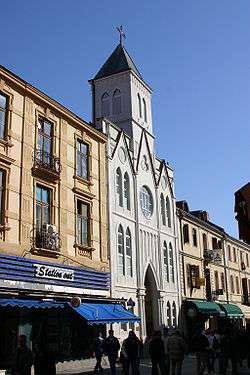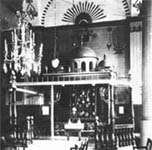Religion in the Republic of Macedonia
In the Republic of Macedonia, the most common religion is Orthodox Christianity, practiced by most of the ethnic Macedonians. The vast majority of the Orthodox Christians in the country belong to the Macedonian Orthodox Church, which declared autocephaly from the Serbian Orthodox Church in 1967.
Muslims are the second-largest religious group with almost one-third of the population adhering to Islam, mainly from the country's Albanian and Turkish minorities. There are also many other religious groups in Macedonia, including the Catholic Church, Protestantism, and Judaism.
In 2011, through a survey carried out by Ipsos MORI in the Western Balkans, the religious composition of Macedonia was found to be 70.7% Christian, divided in 69.6% Eastern Orthodox and 0.4% Catholics and Protestants, and 28.6% Muslim, with unaffiliated Muslims making up the 25.6%.[1]
Christianity
Eastern Orthodoxy
Eastern Orthodoxy has had a long history in Macedonia, and remains the majority religion. In 1019 the Archbishopric of Ohrid was established. In 1767 on order of the Sultan, the Archbishopric was abolished by the Turkish authorities and annexed to the Patriarchate of Constantinople. Throughout the 19th and 20th centuries there was an effort to reinstate the Archbishopric of Ohrid. The Macedonian Orthodox Church gained autonomy from the Serbian Orthodox Church in 1959 and declared the restoration of the Archbishopric of Ohrid. On July 19, 1967, the Macedonian Orthodox Church declared autocephaly from the Serbian Orthodox Church. Most Macedonians belong to the Orthodox faith. In 2001 the Church had about 1,350,000 adherents in Macedonia.[2] Since 2005, canonical Orthodox Ohrid Archbishopric was restored, with autonomous status within the Serbian Orthodox Church.
Other Christianity

The Macedonian Catholic Church was established in 1918. It is a Byzantine Rite sui juris particular church in full communion with Pope and the rest of the Catholic Church, alongside the Eastern Catholic Churches and uses Macedonian in the liturgy. The exarchate was dissolved in 1924. In 2001 the Holy See re-established the Byzantine Catholic Apostolic Exarchate of Macedonia. Currently, members of the Macedonian Catholic Church number about 11,266.[3]
There are a number of Protestants in Macedonia. In the late 19th and early 20th centuries, American missionaries converted villages in the Strumica-Petrich region to Methodism, a faith still practiced. There is also a small community of Macedonian Baptists which has existed since 1928.[4]
The Serbian Orthodox Church operates among the Serbians in Macedonia's North. The number of adherents corresponds with the number of Serbs at 36,000.
Islam
Islam has had a significant influence in Macedonia since the Ottoman invasions in the 14th and 15th centuries. Many Turks settled in Macedonia and introduced aspects of Islamic culture. Most Albanians and some ethnic Macedonians converted to Islam, these Macedonian Muslims or Torbeši generally retained their Macedonian culture and customs while many were assimilated as Turks.[5] By the 19th Century most of the cities were primarily populated by Muslims.[5] The Šarena Džamija in Tetovo is a legacy of the country's Ottoman past. Macedonia's Muslim population was approximately 500,000 in 2002. In 2002, Muslims form approximately 33.33% of the nation's total population.There was no census since 2002 which means that it's all estimates and non-credible sources for the period between then and now.
Judaism

Jews had been present when the region now called the Republic of Macedonia was under Roman rule in the second century AD. The population was decimated by the Crusades, but rose again following the immigration of Sephardic Jews under the Ottoman Empire. In the Second World War, Macedonia was occupied by Bulgaria, an Axis power, and the Jews were sent to concentration camps.[6] As in the rest of the Balkans, the Holocaust and immigration to Israel means that Macedonia now has a much smaller Jewish community, numbering roughly 200. It is mainly based in the capital, Skopje, and has no functioning synagogue.[7]
Hinduism
See also
References
- 1 2 "Strategies of symbolic nation-building in West Balkan states: intents and results (completed) - Department of Literature, Area Studies and European Languages". www.hf.uio.no. Retrieved 2018-01-19.
- ↑ CIA - The World Factbook - Macedonia
- ↑ Annuario Pontificio 2012, p. 1031
- ↑ Историја на македонската нација. Блаже Ристовски, 1999, Скопје
- 1 2 Niel Simpson, Macedonia; Its Disputed History, Aristoc Press.1994
- ↑ "Archived copy". Archived from the original on 2011-09-26. Retrieved 2011-07-11.
- ↑ https://www.jewishvirtuallibrary.org/jsource/vjw/Macedonia.html
